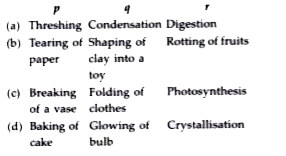A few changes are given below:
a. Making almirah from wood b. Galvanisation of an iron pot C. Making an aeroplane from a paper d. Formation of acid rain from air pollutants e. Photosynthesis f. Breaking of vase
Classify these changes into : I. Irreversible-physical change II. Chemical change III. Reversible-physical change

The correct Answer is:A
a, f are irreversible physical changes, b, d, e are chemical changes and c is a reversible physical change.
Topper's Solved these Questions
- NSO QUESTION PAPER 2018-19 SET ABOOK - SCIENCE OLYMPIAD FOUNDATION CHAPTER - NSO QUESTION PAPER 2018-19 SET AEXERCISE - ACHIEVERS SECTION
1 Videos
- NSO QUESTION PAPER 2018- 19 SET - BBOOK - SCIENCE OLYMPIAD FOUNDATION CHAPTER - NSO QUESTION PAPER 2018- 19 SET - BEXERCISE - ACHIEVERS SECTION
1 Videos
- NSO QUESTION PAPER 2019- 20 SET - BBOOK - SCIENCE OLYMPIAD FOUNDATION CHAPTER - NSO QUESTION PAPER 2019- 20 SET - BEXERCISE - ACHIEVERS SECTION
1 Videos
Similar Questions
Knowledge Check
The change in which the shape , size, appearance or state of a subtance may alter but its chemical composition remains the same is called a physical change . In a physical change, no new substance is formed. Any change that involves the formation of a new substance and leads to a transformation of chemical identity is called a chemical change.
Chemical changes are usually accompanied with heat exchanges. Chemical changes are permanent changes which are usually irreversible.
Select the incorrect statement (s).
(I) Although ice, water and water vapour all look different and display different physical properties, they are chemically the same.
(II) During burning of a candle, both physical and chemical changes take place.
(III) Both water and cooking oil are liquid but their chemical characteristics are different. They differe in odour and inflammability.
(IV) It is the physical property of oil that makes it different from water.AI and IIBII and IIICI,II and IIIDOnly IVTwo changes are stated below:
(i) a piece of iron becomes red when heated strongly.
(ii) a piece of paper gives bright yellow flame when heated strongly.
Which of the above changes is a physical change?A(i) onlyB(ii) onlyCBoth (i) and (ii)DNeither (i) nor (ii)While explaining the working of a clinical thermometer, Ms. Kusum, a science teacher explained that when temperature rises, mercury in the thermometer expands (Process I) and when temperature goes down, the mercury contracts and falls to a lower reading (Process II). Which of the following statements are correct regarding the processes I and II?
(i) Both processes represent chemical changes.
(ii) Both processes are reversible.
(iii) Process I is a physical change and process II is a chemical change.
(iv) Both processes represent physical changes.A(ii) and (iv) onlyB(i) and (ii) onlyC(ii) and (iii) onlyDNone of these
How will you justify that the formation of water from hydrogen and oxygen is a chemical change and not a physical change ?
View SolutionNeha observed a few changes and tried to classify them into three types as
p - Physical, irreversible changes
q - Physical, reversible changes
r-Chemical, irreversible changes.
Select the incorrect classification.

View SolutionClassify the following into different changes.
(a) Making of dough from flour
(b) Digestion of food
(c ) Germination of seeds
(d) Burning of paper
View SolutionIdentify the physical and chemical changes among the following.
(a) Preparation of liquefied petroleum gas
(b) Usage of liquefied petroleum gas
(c ) Formation of manure
(d) Formation of glass
(e) Breaking of glass
View SolutionWhich of the following are chemical changes ?
(a) Growth of a plant
(b) Rusting of iron
(c ) Mixing of iron filings and sand
(d) Cooking of food
(e ) Digestion of food
(f) Freezing of water
(g) Burning of a candle
View Solution
